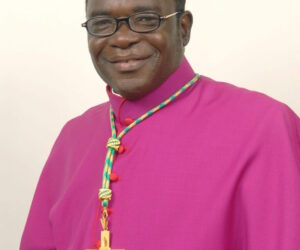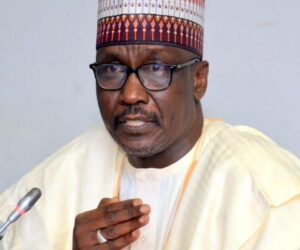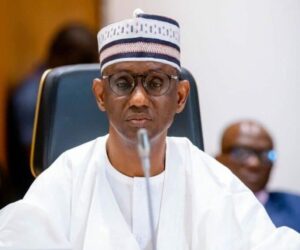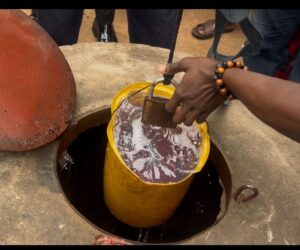President Bola Tinubu has applauded the chairman of the the Economic and Financial Crimes Commission (EFCC), Ola Olukoyede, for achieving new heights in asset recovery and convictions.
Naija News reports that Tinubu commended Olukoyede during his keynote address and official opening of the 7th EFCC-NJI Capacity Building Workshop for Justices and Judges, on Monday, October 20, 2025 at the National Judicial Institute, Abuja with the theme: “Enhancing Justice in the Fight against Economic and Financial Crimes.”
The President, who was represented by Vice President Kashim Shettima, stated that his administration has prioritized public accountability by strengthening the anti-corruption agencies and accorded them the needed independence to execute their statutory mandates.
Tinubu called on judges and justices to give their utmost in the fight against corruption, noting that the judiciary was critical to a successful anti-crime fight.
He said, “As an administration we have prioritized public accountability by strengthening the anti-corruption agencies and accorded them the needed independence to execute their statutory mandates. This enabling environment is evident in the impact that has been made in the last two years.
“The EFCC for example has recorded over 7,000 convictions in the first two years of the present administration and recovered assets in excess of Five Hundred Billion Naira. Recovered proceeds of crime by the agency have been ploughed back into the economy to fund critical social investment programmes, including the Students Loan and Consumer Credit schemes.
“We have an opportunity to consolidate the efforts of the last two years to deliver an optimal anti-corruption framework that will support our peaceful growth and development. A Nigeria free of corruption is possible, if we all commit to doing what is right in our respective spheres of influence and ensuring that those who deviate from the norm are not allowed to go scot-free. A robust judicial system is central to the success of anti corruption efforts and I count on our judges.
“We have allowed both the judiciary and the anti-graft agencies to exercise their constitutional and statutory powers to dispense justice and restore sanity. The evidence is before your eyes. We cannot claim to have excelled in our pursuit of a transparent system if we do not live by such examples. Courts and judges are strong pillars of the anti-corruption process. Except the society has full confidence that those who pillage our resources will be subjected to the rule of law and brought to justice through a fair and transparent process of adjudication, the sneers over our collective commitment to fighting corruption will only get louder. This point should resonate with your lordships. Your vantage position on the bench does not insulate you from the consequences of corruption.”

In his remark, Olukoyede said he had always been conscious of the enormous role of the judiciary in enforcing the rule of law, stressing that the last two years of being in office have further brought the importance of the judiciary as the cornerstone in the fight against corruption into sharper focus.
He regretted the long-winding courtroom procedures that encumber the Commission’s progress in high profile corruption cases.
He said, “The milestones we have recorded in the past two years are almost overshadowed by public concern over the progress of high profile cases in court. The seeming convoluted trajectory of many cases involving politically exposed persons evoke gasps of exasperation, incredulity and sometimes disdain by the people. Without mentioning specific cases and courts, there are cases filed by the Commission 15 or 20 years ago that appear in limbo, moving in circles.
“We appeared to have grown accustomed to a predictable pattern in high profile prosecutions: When investigations are concluded, getting PEPS to appear in court to answer to charges is a herculean task itself. When that hurdle is overcome, and the charge is read, other antics unfurl. It is either the charges are not properly served, or the defendant who hitherto was fit as fiddle suddenly comes down with some of the most chronic ailments under the sun. A medical report is brandished and technical adjournment procured.”

Speaking further, the EFCC boss stated that the anti-graft agency is disturbed by the trend in which some judges of state high courts issue orders to apprehend the powers of the Commission to investigate money laundering cases, even though it is clearly established that those matters are outside their purview.
He added, “Contradictory decisions by courts of coordinate jurisdiction in high profile corruption cases encumbers the work of the Commission. There is also the case when senior lawyers are allowed to stall the arraignment of corruption suspects through frivolous applications. These antics leave the society with suspicion that the courts and the prosecution are not keen about justice. This feeds into the theme of the workshop: Enhancing Justice in the Fight Against Economic and Financial Crimes. It is a clarion call to interrogate the absurdities obstructing the flow of the wheel of justice, especially in cases of corruption and other forms of economic crime.”
Also speaking at the event, the Chief Justice of Nigeria and Chairman, Board of Governors, NJI, Justice Kudirat Kekere-Ekun stated that the annual EFCC-NJI Workshop aims to renew their collective commitment to the cause of justice, strengthen institutional capacity, and deepen public confidence in the judiciary.
He added, “Our duty is not only to punish wrongdoing but also to ensure that justice is delivered through processes that are fair, transparent, and consistent with constitutional safeguards. Decisions of judicial officers have a profound impact on the growth and stability of our nation. It therefore behoves us to ensure that those decisions reflect an appreciation of the evolving dynamics of financial systems, the complexities of the global economy, and the rapid technological innovations that enable both legitimate commerce and criminal enterprise. We must remain proactive and adaptive, ensuring that the law continues to keep pace with the innovations that criminals exploit.
“The fight against economic and financial crimes cannot succeed if the judiciary falters. Each ruling, each judgment, carries implications that extend far beyond the courtroom; they either strengthen or weaken the people’s faith in the capacity of the law to hold all persons accountable, regardless of status, power, or privilege. This is why we must be deliberate and disciplined in applying the tools already at our disposal.”

Also, the Attorney General and Minister of Justice, Lateef Fagbemi charged that for the anti-corruption to be won, justice must be swift, stressing that the annual workshop represents a collective resolve to build a justice system that does not merely punish corruption, but prevents it.
He stated, “This gathering represents not just an institutional collaboration, but a reaffirmation of our collective resolve to build a justice system that does not merely punish corruption, but prevents it, and eradicates its rule. The fight against economic and financial crimes is not just a legal battle. It is a moral duty, a civic responsibility and an act of national preservation. When corruption thrives, justice withers. When justice sleeps, corruption leads.”
© 2025 Naija News, a division of Polance Media Inc. Contact us via [email protected]








